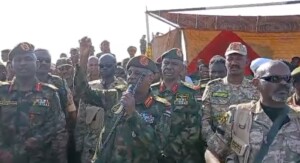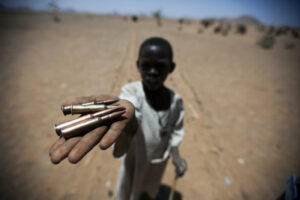OCHA Sudan: more than 125 killed in Kulbus conflict and more than 18,300 affected by Abu Jubeiha clashes
The United Nations Office for Humanitarian Affairs (OCHA) published two new reports today on the situations in Abu Jubeiha, South Kordofan, and Kulbus, West Darfur. In Kulbus, an estimated 50,000 people have been displaced due to fighting that killed more than 125 people, mostly from the Gimir tribe. In Abu Jubeiha, about 18,300 people have been affected by the conflict between Kenana and Hawazma tribes.
 Displaced in El Sareif, North Darfur, in 2013. People escaping the conflict in Kulbus have also fled to El Sareif (Albert González Farran/UNAMID)
Displaced in El Sareif, North Darfur, in 2013. People escaping the conflict in Kulbus have also fled to El Sareif (Albert González Farran/UNAMID)
The United Nations Office for Humanitarian Affairs (OCHA) published three new reports today on the situations in Abu Jubeiha, South Kordofan, and the related clashes in Kulbus in West Darfur and Saraf Omra in North Darfur. In Kulbus, an estimated 50,000 people have been displaced due to fighting that killed more than 125 people, mostly from the Gimir tribe. In Abu Jubeiha, about 18,300 people have been affected by the conflict between Kenana and Hawazma tribes.
The first report highlighted that "following fighting between 6 and 11 June in West Darfur’s Kulbus locality, an estimated 50,000 people were reportedly displaced within Kulbus locality and in neighbouring localities in West Darfur (Sirba and Jebel Moon), and Saraf Omra and El Sareif localities in North Darfur". At least 125 people were killed, and many others were injured due to the conflict.
On 6 June, clashes erupted between the Gimir and Rizeigat communities in Um Hariz village in Kulbus locality, West Darfur. The conflict erupted following a dispute over land ownership between a Gimir man, a non-Arab African tribe, and a Rizeigat man, an Arab herding tribe. The two tribes have had conflict in the past.
"Both men were killed during the gunfire exchange and more people were killed when the clashes spread to a livestock waterpoint and Um Tuyur village", OCHA writes. The Gimir community reported 101 of their people killed and 117 injured while an Amir Rizeigat stated that 25 Arabs were killed and 16 injured during the clashes.
Nine Gimir people were also abducted while traveling between Saraf Omra and Kulbus and are still missing. OCHA highlighted that 25 Gimir villages were reportedly attacked, looted, and burnt, whilst a key Amir of the Arabs has discounted reports that three Arab settlements were burnt.
Leaders of the Rizeigat and Gimir tribes have discussed the need to prevent further escalation of the conflict. A committee has been established and is visiting the affected locations in Kulbus to urge their people to stop further hostilities, OCHA said.
'These conflicts have serious humanitarian implications as the insecurity makes it challenging to access the populations in need' – OCHA
"These conflicts have serious humanitarian implications as the insecurity makes it challenging to access the populations in need, both for ongoing humanitarian programmes and the newly displaced," the organisation wrote.
An estimated 125,000 people are also still displaced in West Darfur's Kereinik and El Geneina after recent violence between Arab herding nomads and sedentary Masalit farmers. Most of the 200 people killed in those attacks belonged to the Masalit ethnic group.
Darfur has a long history of strife between Arab herding tribes and non-Arab African herders or sedentary farmers. Arab tribesmen were recruited by the previous regime of dictator Omar Al Bashir to join the Janjaweed militias. Al Bashir employed these Arab militias to repress a revolt over ethnic marginalisation in the region, mainly targeting non-Arab African farmers. During the war that followed, at least 300,000 people were killed and over 2.5 million were displaced according to the UN.
Saraf Omra
In another report, OCHA added that nearly 19,000 people have been displaced in North Darfur after fleeing the conflict that spread into North Darfur from West Darfur’s Kulbus locality.
Between June 7 and 10, 13 Gimir villages in North Darfur were attacked as tribal conflict between the Gimir and Arab Rizeigat tribes in Kulbus spread to North Darfur, leaving two villages burned, seven villages partially burned, and four villages looted. Nine villages were in Saraf Omra and four in El Sareif localities, both located on the border with West Darfur.
The organisation highlighted that most of the new arrivals in Saraf Omra and El Sareif localities are women and children.
Abu Jubeiha report
The report on South Kordofan’s Abu Jubeiha locality highlighted that about 18,300 people have been affected by the conflict between Kenana and Hawazma tribes. About 406 homes in six neighbourhoods in Abu Jubayhah town were burned during the conflict, OCHA wrote.
Conflict erupted between the Hawazma and Kenana tribes following the armed robbery of a vehicle (tuk tuk) belonging to the Hawazma by members of the Kenana in Abu Jubeiha on 5 June. During the robbery, one of the Kenana tribesman was killed.
According to OCHA, government security forces have been deployed to the conflict areas, but the situation remains tense.
Four days ago, the mayor warned that the situation in the town was likely to explode at any moment. He referred to the continuous flow of militant tribesmen to the town from outside the locality. Locals threatened to defend the town and its residents by themselves if the government did exert its power by stopping the flow of militants into the town.
The Executive Director of Abu Jubeiha locality in South Kordofan, Simon Tab, said last week that at least 19 people had been killed so far among the parties involved in the conflict, along with 41 wounded, 16 of whom are still in critical condition.
OCHA explained that humanitarian partners have started delivering health and water assistance and charities have provided food assistance to those affected and that the main needs are food, shelter and non-food items, water, sanitation and hygiene, health and nutrition services, as well as psychosocial and protection support.











 and then
and then